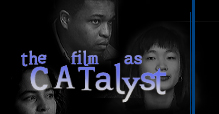Review of Content & Suggested Discussion Questions
Talking About Race, Module 1
SECTION 1
Groups on Campus
Module 1 begins with students talking about their expectations of what they thought they would find when they went to college.
Notice the difference in perspectives between the first two students. Marc and Brian both attend the same university, but they have completely different views about how many students of color attend the university.
This section continues with different perspectives on how and why students separate themselves by race on campus. Dane does not see the reason to have separate organizations for students of color and doesn’t understand why “all the Black students sit together” in the cafeteria. Freda responds with the observation that in fact all the White students also sit together. Duane ends the section by commenting that as a Black student, why should he have to come over to someone else’s group, when they can come over to his.
Discussion Questions
- What were your expectations about whom you would meet at college? How have your expectations differed from reality?
- Since you have been at college do you find you are friends with the same “kinds” of people you knew at home, or has there been a change?
- Have you experienced the desire to be around people who are like you? When is this important to you? When was the first time you became aware of your racial identity.
- How do you feel about Freda’s comment that “all the White students sit together?”
SECTION 2
Campus Climate
This section begins with Lisa talking about how uncomfortable she feels when issues of race and ethnicity come up at her school. Khanh then introduces the concept of reverse discrimination by talking about White students claiming to be “victims” when taking an ethnic studies class. Tammy then talks about her experience joining the Black Awareness Committee.
In the next part of this section we hear statements by three White students. Dane begins with a confession about using racist epithets; Marc explains how he feels Blacks are hypersensitive to characterizations of themselves; and, Michael tells us how he believes it is wrong to declare someone hypersensitive until you truly understand their circumstances.
It is key here to notice the different developmental levels of the White students indicated by their comments. Think about how the stereotypes and assumptions that each student holds are underlying the opinions they express.
Discussion Questions
- How is the use of derogatory terms related to stereotypes?
- Why should we avoid stereotyping?
- How do you react when you feel someone is stereotyping you?
- Do you think people would have a different reaction to someone stuffing their bellies for “Italian night” than they would to putting on “black face” for “African night?” Why?
- How would you feel about joining a student organization in which all the members were of a different racial group than yourself?
SECTION 3
Affirmative Action
This section focuses on the sensitive topic of affirmative action. We hear three perspectives. Marc tells us about friends who have not received scholarships which he believes were given to students based on their race. Freda then explains how ridiculous it is that people assume “she just walked in here” without working hard. Finally, Judith tells us that she did in fact get into college because of affirmative action and why that was necessary.
Responsibility for Change
The first film concludes with Marc telling us that he and others like him should not be blamed for slavery. Brian points out the need to understand that although young people today should not be blamed for what happened in the past, we all need to take responsibility for the way things are and ask ourselves, “what are we doing about it?”
Discussion Questions
- What is affirmative action? Why is it necessary?
- How have you been positively impacted by affirmative action?
- What can you do on your campus to make an impact on race relations?






